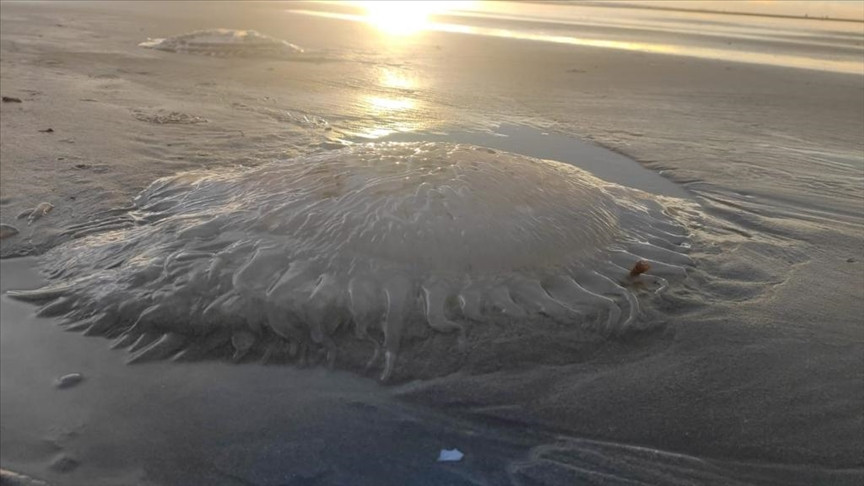
Hundreds of dead jellyfish weighing 10-15 kilograms have been spotted washing up ashore on Cox’s Bazar Beach in Bangladesh since a government-imposed fishing ban ended in the Bay of Bengal.
The unusual deaths of the sea creatures in such big numbers have raised concerns among experts and officials.
Following the 65-day ban on fishing, which was aimed at ensuring a safe environment for fish during their breeding season, more than 4,000 fishing boats have entered the sea since July 23 to catch fish such as hilsa, a kind of Indian herring.
Deepak Sharma, president of the Cox's Bazar Forest and Environment Conservation Council, told Anadolu Agency that jellyfish often die in small numbers in the winter, but it is unusual in the rainy season or fishing season.
“We had seen the dead jellyfish floating ashore soon after the government ban on fishing ended and hundreds of fishing boats sailed in the Bay of Bengal. We suspect that the sea creatures got caught in the fishing nets in the deep sea and died and floated to the beach,” said Sharma.
“Fishermen don’t collect or sell jellyfish caught in fishing nets. Rather, they release them into the sea, whether they are alive or dead.”
The number of dead jellyfish declined this week, however, he said, adding that sea pollution could also be among the causes.
Pollution in Bay of Bengal is risk to marine ecology
Fazlul Quader Chowdhury, a resident of Cox’s Bazar District and president of the Cox's Bazar branch of the Bangladesh Environment Movement (BAPA), told Anadolu Agency that he visited Cox’s Bazar, the country’s tourist hub, and found hundreds of dead jellyfish on the beach last Thursday.
Read more: Jellyfish population up on climate change
“We people who live in Cox’s Bazar close to the sea beach have never witnessed the deaths of jellyfish in such a big number,” he noted.
“So many unscrupulous people dump waste in the Bay of Bengal, which continues to pollute it and the world's largest sea beach. Meanwhile, we have evidence of waste dumping at the Bangladesh sea line by Myanmar as waste floated to the beach recently. All these cause the sea to be polluted and risk sea ecology,” Chowdhury said.
“This marine creature lives in a separate zone and ecology in the deep sea. We don’t report the deaths of other fish floating on the shore. So we need to have an investigation in the deep sea engaging the country’s naval force to know whether there is any pollution or ecological imbalance,” the environmental rights activist added.
Bangladesh is the 10th worst country in the world in terms of waste management and dumps waste in the Bay of Bengal.
Recently, a number of deep sea whales and dolphins were found dead onshore, which means the Bay of Bengal is being highly polluted. Such pollution is also an increasing threat to the country’s “Blue Economy” policy, which offers the country huge prospects and potential, say experts.
Chowdhury disagreed with the 65-day fishing ban, saying it helped no one except fishermen from India and Myanmar as they continue to cross Bangladesh’s marine border and are often caught by the Bangladesh Coast Guard for illegal entry and fishing.
Bangladesh’s coast guard recently released some Indian fishermen after they were caught red-handed violating the country’s marine border for fishing.
Marine officials start investigation
The Bangladesh Marine Research Institute collected samples from the beach. They said it may cause various problems including itching if people come in contact with the carcasses of the box jellyfish.
Abu Syed Md Sharif, a senior officer at the Bangladesh Oceanographic Research Institute, told Anadolu Agency that like other fish species and sea creatures, jellyfish had also increased in the breeding season and during the 65-day fishing ban in the Bay of Bengal.
However, after the ban’s withdrawal, hundreds of fishing trawlers have entered the sea, he said.
“We suspect that the jellyfish died after being caught in the fishermen's nets and later floated to the shore in the tidal waters. We paid another visit to the Bay of Bengal this Sunday and conducted a survey to investigate the situation further.
“Fishermen usually keep fishing nets in the deep sea for an uninterrupted six hours during fishing. And if jellyfish are caught in those fishing nets, they die, as they couldn’t survive in such a strangling situation,” Sharif said.
“We didn’t report any live jellyfish floating on the beach, so we believe sea pollution is not the cause behind their deaths.
“We, however, have taken the incident seriously and started looking into the situation to know whether sea pollution or other causes are behind the incident of floating dead jellyfish,” he added.
1732071267-0/lana-(2)1732071267-0-405x300.webp)
1727242355-0/Diddy-(1)1727242355-0-165x106.webp)

1732063440-0/elon-(3)1732063440-0-165x106.webp)
















COMMENTS
Comments are moderated and generally will be posted if they are on-topic and not abusive.
For more information, please see our Comments FAQ